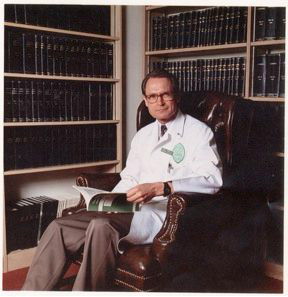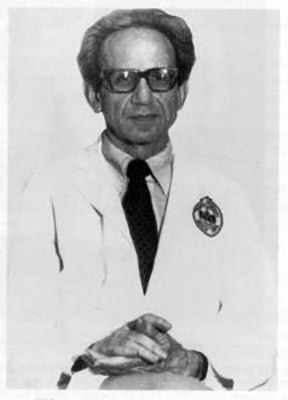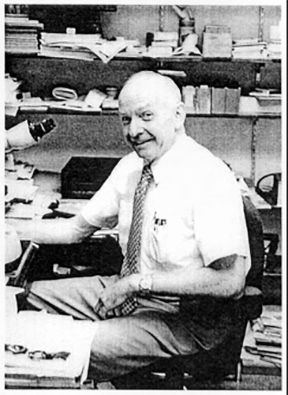The Dr. and Mrs. Michael A. Gerber Memorial Lecture Series
This Lecture Series was established to honor the memory of Dr. Michael A. Gerber and his wife, Minda. From 1987—1997, Dr. Gerber was the Chairman of the Department of Pathology and Laboratory Medicine at  Tulane University Health Sciences Center (TUHSC).
Tulane University Health Sciences Center (TUHSC).
Internationally renowned as an academic pathologist and brilliant hepatic pathologist, Dr. Gerber had a passion for basic science research, organizing the first “Tulane Basic Science Research Day” in 1988. Under his continued leadership, the event evolved into a forum of stimulating ideas and remains a showcase for the work being carried out at TUHSC. Part of his remarkable legacy was the establishment of the Molecular and Cellular Biology Graduate program; writing over 230 peer reviewed articles and book chapters; his internationally renowned, groundbreaking work on the pathobiology of Hepatitis B and C Viruses, and hepatocellular carcinoma.Read More
Dr. Michael Gerber, native of Kassel, West Germany, achieved his M.D. from the University of Mainz, West Germany, and spent his internship at Rutgers University in New Jersey. Under the tutelage of renowned hepatopathologist, Hans Popper of Mount Sinai Hospital in New York, he quickly rose through the ranks of academia to become full professor at Mount Sinai in 1980.
Educator, scientist, and mentor aside, Dr. Gerber was also a genuinely fine and considerate person.
Current Lecture
2021: "Liver Fibrosis in NASH" by David Brenner, M.D., University of California at San Diego (Postponed from 2020)
Presentation Date: Wednesday, April 14, 2021
Time: 12:00 Noon
Additional Information Gerber Memorial Lecture
2019: "Transforming the Treatment Landscape for Hepatic Fibrosis and NASH - Principles and Progress," by Scott L. Friedman, MD, Dean for Therapeutic Discovery, Fishberg Professor of Medicine, Professor of Pharmacologic Sciences, Chief, Division of Liver Diseases, Icahn School of Medicine at Mount Sinai
2018: "The Epidemic of Hepatocellular Carcinoma," by Hashem B. El-Serag, MD MPH, Professor of Medicine & Gastroenterology, Baylor College of Medicine, Chief, GI Section, Michael E. Debakey VA Medical Center
2017: "Modeling Human Hepatocellular Cancer for Precision Medicine," by Satdarshan "Paul" Monga, MD, Endowed Chair & Division Director, Experimental Pathology Vice Chair, Department of Pathology, University of Pittsburgh School of Medicine
2016: "Autophagy - Eating Your Way ot of Nonalcoholic Fattly Liver Disease," by Mark J. Czaja, MD, FAASLD, Emory UniversitySchool of Medicine
2015: "Prevention of Hepatocellular Carcinoma," by Adrian M. Di Bisceglie, MD, Chairman, Department of Internal Medicine, Chief of Hepatology, St. Louis University School of Medicine
2014: "Cell Therapy for Liver Diseases: Hepatocytes vs. Stem Cells," by Markus Grompe, MD, Ray Hickey Chair, Director, Papé Family Pediatric Research Institute, Oregon Stem Cell Center, Oregon Health & Science University
2013: "Emerging Therapeutic Concepts for Cholangiocarcinoma," by Gregory Gores, MD, Reuben R. Eisenberg Professor Chair, Division of Gastroenterology & Hepatology, Mayo Clinic College of Medicine
2012: “Modeling Cholangiocarcinoma Progression: Do Cancer-Associated Myofibroblasts Matter?” by Alphonse E. Sirica, PhD, Virginia Commonwealth University School of Medicine
The William H. Sternberg - Richard J. Reed Surgical Pathology Lecture Series
Dr. William H. Sternberg
William H. Sternberg graduated from Cornell Medical School in 1937 and selected pathology as his future. His five years as an intern and pathology resident were divided between Montefiore Hospital in New York City  and Beth Israel Hospital in Manhattan with completion in 1942. During World War II, he was a medical officer in New Orleans, frequently visiting the Pathology Department at Tulane University. His talents were greatly appreciated and he joined Tulane University in 1944 as an Instructor in pathology.
and Beth Israel Hospital in Manhattan with completion in 1942. During World War II, he was a medical officer in New Orleans, frequently visiting the Pathology Department at Tulane University. His talents were greatly appreciated and he joined Tulane University in 1944 as an Instructor in pathology.
Although he was offered the position of Chief of the Gynecologic Pathology Department at the Armed Forces Institute of Pathology in Washington, DC, he declined the offer and stayed in New Orleans where he rose to the rank of Clinical Professor of Pathology. While at Tulane, Dr. Sternberg had a very prolific career. He was a master of gross pathology and a superb consultant for other academic and private pathologists. He was a pioneer in endocrine and gynecologic pathology, as well as cytopathology.Read More
In the 1960’s, he became interested in intersex disorders and cytogenetics. Realizing the future of genetics, he created the Cytogenetics Laboratory at Tulane in 1962 that ultimately evolved into the Hayward Genetics Center. He wrote leading papers on intersex disorders, luteoma of pregnancy, hilar cell lesions, proliferating Brenner tumor, among many others. Dr. Sternberg was renowned both nationally and internationally. A respected mentor to numerous future well-respected pathologists, Dr. Sternberg died at the age of 76 on January 23, 1990.
~~~~
Dr. Richard J. Reed
Richard J. Reed graduated from the Tulane University School of Medicine in 1952 and interned at Parkland Hospital in Dallas, Texas. He opened a general practice office in Gilmer, Texas, but after two years made the  decision to pursue a career in anatomic pathology. He began his training as a resident at Tulane and completed his training in 1961 at Barnes Hospital in St. Louis under the tutelage of Dr. Lauren Ackerman. Returning to New Orleans, Dr. Reed embarked on a distinguished career in surgical pathology and dermatopathology at Tulane University School of Medicine, achieving the rank of Professor in 1967. His interest in surgical pathology was wide, but he initially became noted for bone and soft tissue pathology, neuropathology and dermatopathology. He was the first to describe plantar lentigenous melanoma; nerve sheath myxoma; minimal deviation melanoma; neurotrophic melanoma; and the unusual histiocytosis that later became known as Rosai-Dorfman disease. Read More
decision to pursue a career in anatomic pathology. He began his training as a resident at Tulane and completed his training in 1961 at Barnes Hospital in St. Louis under the tutelage of Dr. Lauren Ackerman. Returning to New Orleans, Dr. Reed embarked on a distinguished career in surgical pathology and dermatopathology at Tulane University School of Medicine, achieving the rank of Professor in 1967. His interest in surgical pathology was wide, but he initially became noted for bone and soft tissue pathology, neuropathology and dermatopathology. He was the first to describe plantar lentigenous melanoma; nerve sheath myxoma; minimal deviation melanoma; neurotrophic melanoma; and the unusual histiocytosis that later became known as Rosai-Dorfman disease. Read More
Dr. Reed wrote hundreds of articles in peer-reviewed journals and numerous books and chapters, including an AFIP fascicle on peripheral nerve tumors. He was fervently sought after for lectures, conferences and workshops in surgical pathology at the national and international level. Dr. Reed trained generations of fellows and residents who still cherish their time with him; many became accomplished pathologists and dermatopathologists.
Dr. Reed’s eye, knowledge and expertise were renowned: his consult service received cases from all over the world. Since his retirement academic and private pathologists alike miss the invaluable resource his presence and knowledge provided.
2019: "Beyond Lineage: Diagnostic & Predictive Molecular Immunohistochemistry for Surgical Pathologists," by Jason L. Hornick, MD, Associate Professor of Pathology, Harvard Medical School, Boston, MA
2017: "Common Problems in Interstitial Lung Disease," by Mary Beth Beasley, MD, Professor of Medicine & Pathology, Icahn Medical School, Mount Sinai Hospital, New York, New York
2016: "The Continuing Dilemma of Ductal Carcinoma in Situ," by Stuart J. Schnitt, MD, Vice Chair for Anatomic Pathology, Beth Israel Deaconness Medical Center, Professor of Pathology, Harvard Medical School
Winter 2015: "Glioblastoma - Evolution of Our Understanding," by Peter C. Burger, MD, Professor of Pathology, Neurosurgery & Oncology, Director, Surgical Neuropathology, Johns Hopkins Medical Center, Baltimore, MD
Spring 2015: "The Impact of Advances in Molecular Genetics on Selected Aspects of Soft Tissue Pathology," by Andrew Folpe, MD, Mayo Clinic, Rochester, MN
2013: "Origins of Gynecological Cancer: Discovery and Application," by Christopher P. Crum, MD, Harvard Medical School Director, Division of Women's & Perinatal Pathology, Brigham and Women's Hospital, Boston, MA.
2012: “A Potpourri of Gastrointestinal Dyplasia,” by Elizabeth Montgomery, MD, Johns Hopkins Medical Center, Baltimore.
2011: “WHO Classification of Thymoma: Problem Areas and Controversies,” by Saul Suster MD, Medical College of Wisconsin.
